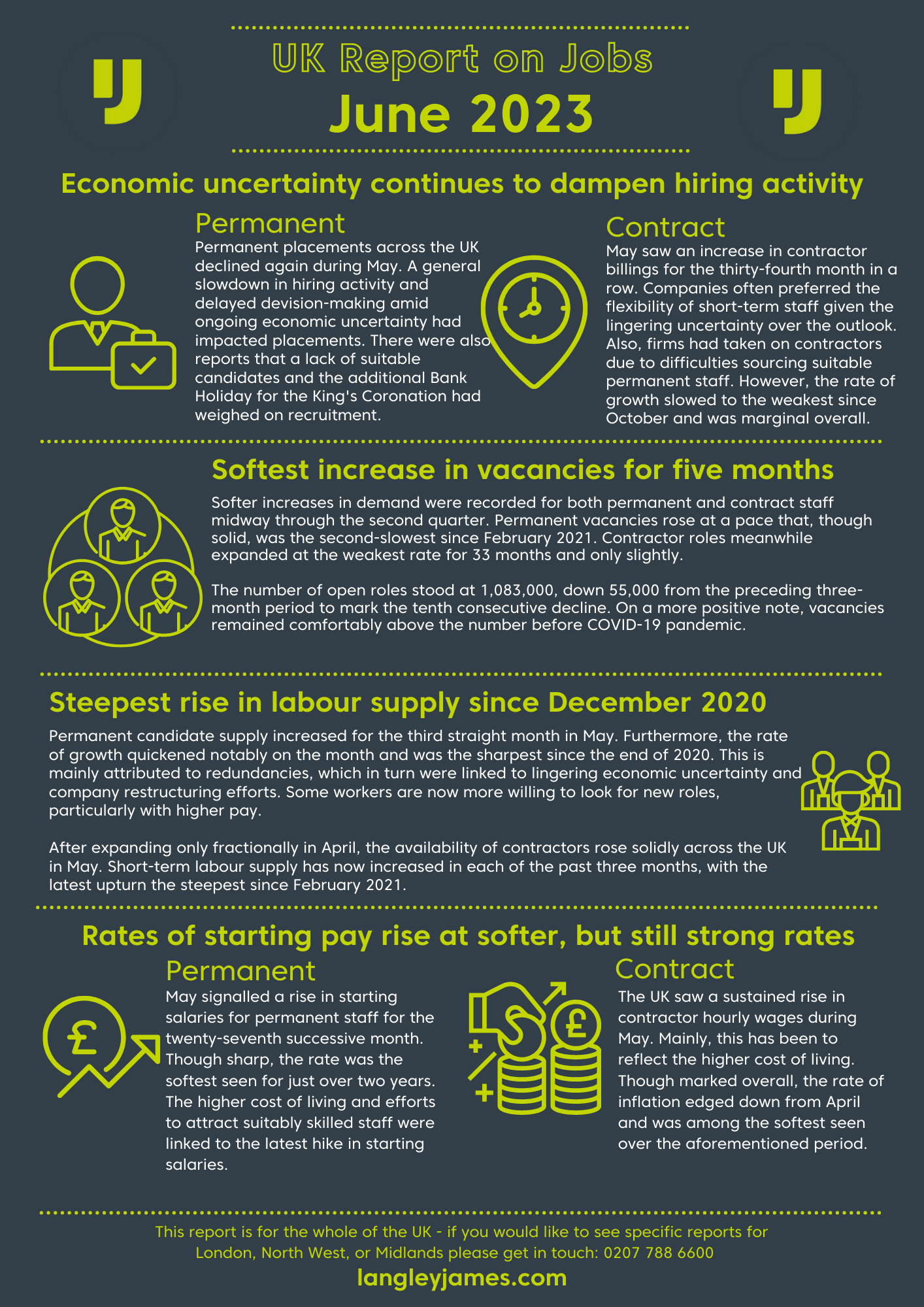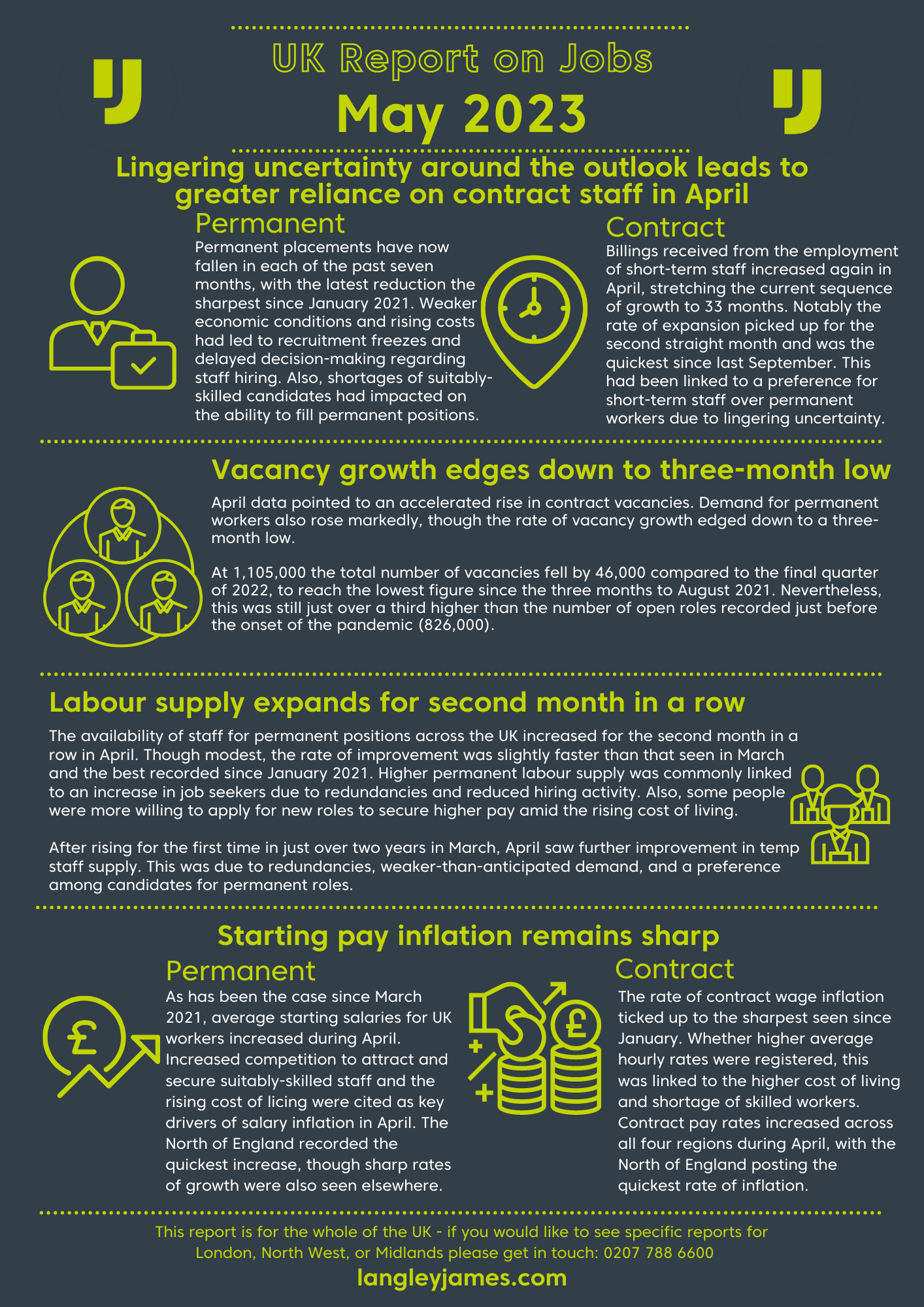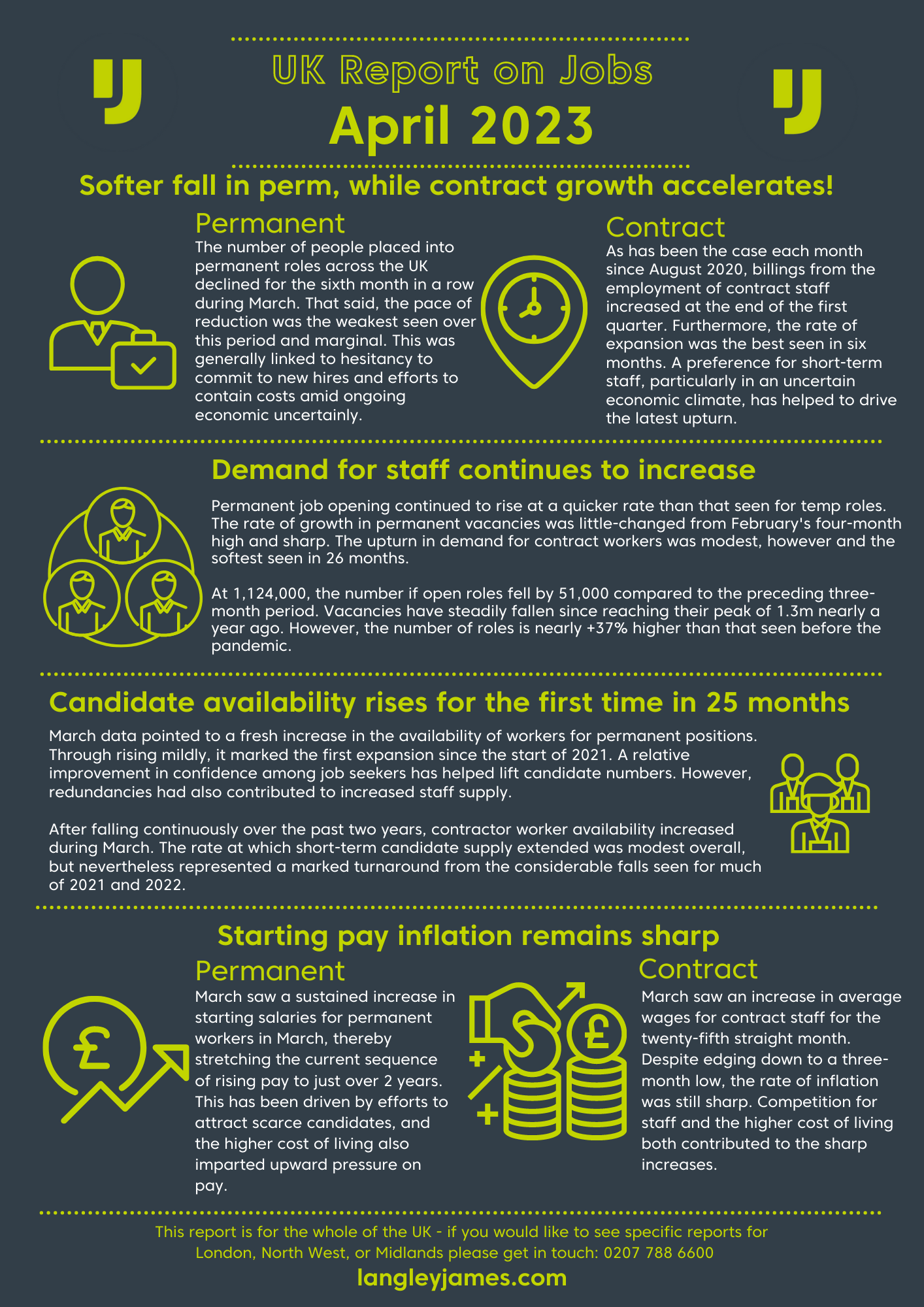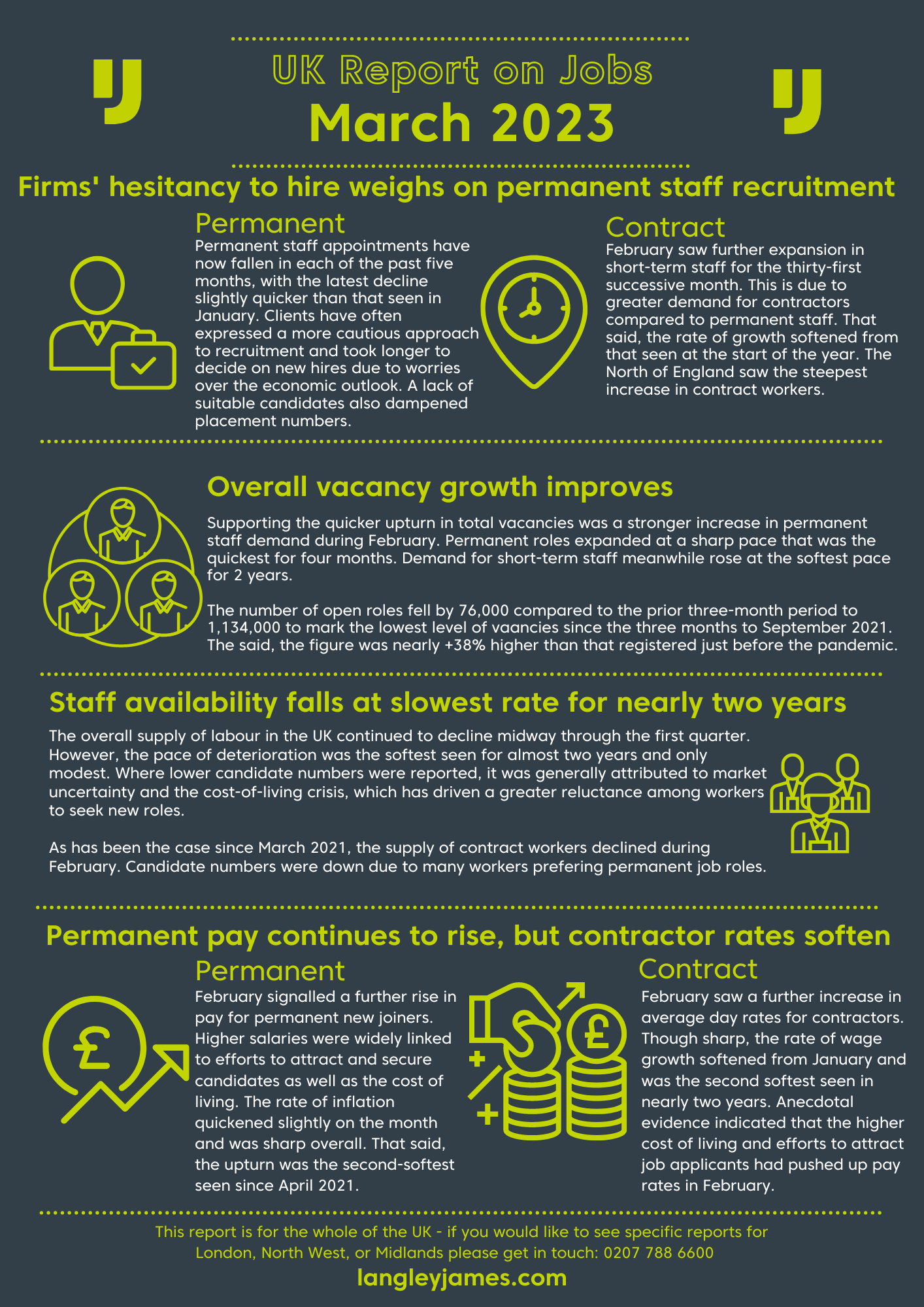
Jun 28, 2023 | Hiring Resources, IT
In today’s competitive IT landscape, hiring managers face a significant challenge—the ongoing IT skills crisis. The demand for skilled IT professionals continues to outpace the supply, making it increasingly difficult to find and secure top talent. However, with the right strategies and innovative approaches, hiring managers can successfully navigate this crisis and build a high-performing IT team. In this blog post, we’ll explore some effective solutions to help you overcome the IT skills shortage and find the ideal candidates for your organisation.
Hiring Mangers Should Embrace the Gig Economy
Incorporating the gig economy into your talent acquisition strategy can be a game-changer. By leveraging IT contractors, you can access a pool of specialised talent on-demand. This flexible arrangement allows you to quickly fill skill gaps and tackle short-term projects without long-term commitments.
Foster Internal Talent Development
Investing in the professional growth of your existing employees can be a strategic solution. Implement training programs, certifications, and mentorship opportunities to upskill and reskill your current team members. By nurturing internal talent, you can fill crucial roles internally and create a culture of continuous learning and advancement.
Tap into Professional IT Networks
Engage with professional IT networks, industry associations, and online communities. Participate in relevant events, conferences, and webinars to connect with IT professionals actively seeking new opportunities. Building relationships within these networks can provide access to a diverse pool of talent and valuable industry insights.
As a Hiring manager You Need to Leverage Social Media and Online Platforms
Harness the power of social media and online platforms to expand your reach and attract top IT talent. Maintain an active presence on platforms like LinkedIn, GitHub, and Stack Overflow. Share engaging content, job openings, and insights about your organisation’s work culture to create a strong employer brand and attract the attention of skilled candidates.
Collaborate with IT Recruitment Specialists
Partnering with an IT recruitment agency can be a strategic move. These specialists, like us, possess in-depth industry knowledge, an extensive network of IT professionals, and expertise in candidate sourcing and screening. They can streamline your recruitment process, saving you time and effort while connecting you with the right talent.
Offer Competitive Compensation and Benefits
To attract and retain top IT talent, it’s crucial to offer competitive compensation packages and attractive benefits. Stay up-to-date with market trends to ensure your salary offers align with industry standards. Additionally, consider flexible work arrangements, professional development opportunities, and perks that cater to IT professionals’ specific needs and preferences. Take a look at our latest IT Salary Guide to get up to date on the current salaries on offer for the most popular jobs in IT.

Hiring Managers Need to Streamline the Hiring Process
In a competitive talent market, a lengthy and complex hiring process can deter top candidates. Simplify and streamline your hiring process to ensure a positive candidate experience. Minimize unnecessary steps, provide prompt feedback, and communicate clearly with candidates to expedite the decision-making process.
Showcase Your Organisation’s Technological Advancements
Demonstrate your organization’s commitment to innovation by highlighting the exciting projects, cutting-edge technologies, and advancements in the IT space. Showcasing your technological prowess and the opportunity for IT professionals to work on meaningful and impactful projects can attract top talent and position your organization as a desirable employer.
Why Hiring Managers Should Work With Langley James
Here at Langley James, we know our candidates. We have in-depth knowledge of their experience, down to the individual projects they have worked on, their strengths (and their weaknesses). We have access to those details that you just can’t get from a CV alone.
Our talented and specialised consultants work hard to ensure that any candidates we send you are not only a perfect match for the role but your business.
To discuss your IT recruitment needs please call us on 0207 099 4839 or email us: langleyjames@langleyjames.com.
We’d love to hear your views on this. What are your thoughts on the current IT skills crisis? Tweet us @ITRecruitment, or follow us on Facebook or LinkedIn

Jun 19, 2023 | IT, Tips
We are in the middle of a long and sustained talent crisis. Candidate availability is decreasing by the day, and job vacancies continue to rise. Albeit at a slightly slower rate over the last few months. But the success of your business depends on your team. The people you hire have a direct impact on your success. So, when it comes to your next vacancy, you may be asking which is best for you – recruitment agency vs direct hiring.
We’ve asked our expert consultants to share their insight on the pros and cons of both to help you make that all important decision.
Agency vs Direct
We’ve written at length about the benefits of working with a specialised recruitment agency, but let’s compare some key areas when it comes to recruitment agency vs direct hiring.
Writing adverts
This may sound like a simple process, but don’t be fooled. Yes, it’s true that we can all write an advert stating the responsibilities and requirements. However, in the current market, that is not enough! Candidates are less likely to apply for a job with a list of demands. They want the story, the feeling, a sense of what you stand for. They want the benefits, the future opportunities, and a sense of being part of something important in the world.
If you don’t have experience of this, you are likely to find that your advert will be a bit of a ‘damp squid’ and won’t attract the people you need to make your business a continued success. Agencies are writing adverts day in, day out. They know what it takes to get the best response.
Access to candidates
A recruitment agency will have access to many more candidates than you will if you recruit direct. Not only do they have a large database of experienced candidates, but they are also able to advertise in lots of different ways. This means that you don’t just get the best people who are currently on the market. A recruiter will also headhunt suitable candidates for you using a combination of technology and their personal network. This means that your shortlist should be the very best candidates for the job.
Direct hiring tends to be focused on adverts, website pages and the odd social media post. The reach is not as great as that of a recruiter. With direct hiring, you are unlikely to have the tools you need to get your advert out as far as it needs to go. Lots of companies use their own employees to recommend candidates. Whilst this is great in some instances, it can have an impact on your diversity. Something to bear in mind with any employee referral scheme.
Sifting through CV’s – Recruitment Agency vs Direct Hiring
Depending on how much time you have, it could be a benefit for you to read through all the applications you receive if you do decide direct hiring is for you. The advantages are that you see not just shortlisted candidates, but every single response. This will give you a real insight into the market (if your job advert is great!) and may give you insight on what you need to change to attract the best.
You’ve also got to have the technical knowledge when it comes to IT. You may be looking for experience in a particular piece of tech. And unless you’re aware of other technologies where skills can easily transfer, you could be missing out on a great candidate!
Either way, be prepared to spend lots of time looking at unsuitable CVs as the pay-off for direct hiring. However, if you don’t have the extra time needed to go through the process, using a recruitment agency van be a valuable way of finding new talent for your business. Shortlisting is completed on your behalf, and you only have to choose who to interview from a shortlist of CVs.

Employer branding
You’ve probably heard more and more people start to talk about employer branding. It’s a vital part of the direct hiring process. When was the last time you reviewed yours? What does your Glassdoor say about you? How are your Google reviews? There are many things to consider when recruiting direct when it comes to how you are perceived in the market.
However, we know that there are some really great companies to work for our there who don’t have any employer brand at all. And if this is you then using a recruitment agency is the best idea. Recruitment consultants are highly skilled at attracting candidates to opportunities. They sell the opportunity first and the company a very close second. This gives the added benefit that any questions candidates have about your values, culture, and more, can be answered directly. So, whether you have a strong employer brand or not, you’ll still get the best candidates using a recruitment agency.
The same can be said for candidate experience too. If you already have a robust recruitment communication process, great, direct hiring could be for you. But remember that candidates expect a response within 24 hours of their application now. They expect to be kept up to date at every stage in the process. Do you have the time and organisation to do that effectively?
Cost
There’s a general misconception in the market that using recruitment agencies can be costly. But this is usually when it’s looked at in isolation and not compared to direct hiring. If you wanted to do the same work as a recruiter does, it could end up costing you considerably more. And this cost increases if you’re not regularly recruiting. Recruitment agencies spend hundreds of thousands of pounds behind the scenes to make sure that they are providing the best service and the best candidates.
You’d be amazed how much it costs to just advertise a job on one job board, let along over 30! Access to CV databases is also at a great cost, and let’s not get started on the costs associated with LinkedIn! Then there’s the time spent searching out the best candidates. At Langley James, we allocate at least 3 full days just to shortlist candidates for you. And in the current market, this can take longer too.
But there’s one huge benefit when it comes to cost. Recruitment agencies will not charge you a penny until they have been successful, regardless of the time spent on the role. This is something you can’t do with direct hiring. You take a financial risk every time you recruit direct – there are no guarantees of success.
Recruitment Agency Vs Direct Hiring – Summary
If you have lots of time on your hands, and an ‘easy to fill’ role then direct hiring will probably work for you. But, if you have a harder to fill role but you still want the very best candidates, without having to invest your own time, you need the help of a recruitment agency.
About Langley James
We have been helping companies to attract and retain the very best IT talent since 1999. But we don’t just simply find the best candidates. We can advise you on the current jobs market conditions. Share data on average IT salaries. Talk to you about the benefits that candidates are looking for. In fact, we do everything we can to help ensure that you get the very best people for your team. Get in touch with our team to find out how we can help you to recruit the best!

Jun 9, 2023 | IT, IT Market Reviews


Jun 4, 2023 | IT, Management
 When was the last time you reviewed the employment discrimination laws before conducting an interview? Most hiring managers have every intention of complying with employment discrimination laws but find that the time needed to keep abreast of the nuances of employment discrimination in areas such as race, gender, religion, national origin, age, marital status, medical history, physical disability or criminal records hard to find.
When was the last time you reviewed the employment discrimination laws before conducting an interview? Most hiring managers have every intention of complying with employment discrimination laws but find that the time needed to keep abreast of the nuances of employment discrimination in areas such as race, gender, religion, national origin, age, marital status, medical history, physical disability or criminal records hard to find.
Yet failure to properly prepare can lead to questions and conversations that should be avoided, a notion we deem as ‘illegal interview questions’. Generally, asking questions alone is not illegal unless the candidate belongs to a protected class and believes that he or she was rejected due to the information that was gathered. If this happens you will be forced to prove that employment discrimination did not occur. Interviewing with this in mind can be unsettling and it can be hard to proceed confidently during the interview process unless you have a solicitor by your side! But many questions that are necessary to screen for the position can tread on dangerous territory.
For example, if we cannot ask a person’s age, how do we find out if the candidate is above the minimum age requirement? What if it is important to check criminal or credit history due to the type of work involved? What if you want to make sure the candidate is able to work overtime due to the demands of the job? How do you determine a candidate’s citizenship?
To help you avoid common pitfalls and subsequent illegal questions in the interview process that could leave your company exposed to a claim for employment discrimination, begin by sticking to the following two practices:
Only Ask Job-Related Questions
Problems can arise from questions asked before the interview even begins! Innocent conversation on topics used to break the ice and make the candidate more comfortable can cause problems if the candidate is rejected. Go ahead and talk about the news, sports or weather, but stay away from personal topics such as children and spouses. A candidate can naively reveal personal information that you did not ask for. Politely steer the conversation back to job-related questions that you have (hopefully) prepared in advance of the interview!
Subject Each Candidate To The Same Hiring Practices
Keeping the interview fair and equal must start by using a job application that asks the same questions of each candidate. If you require testing, make sure that all candidates applying for the job are tested with the same instrument. In advance of the interview, write a job-related, detailed and validated position description. Based on the job description it is advisable to compile a list of solid interview questions that keep to the qualifications of the job. If possible, familiarise yourself with the laws that apply specifically to discrimination.
Blah blah – so what about these taboo questions I hear you say!? Well, here are a range of questions you might want to think about before inviting your next recruit into the building:

A Candidate’s Age…
The only time that it becomes important to know a person’s age is when you think the candidate may not be of legal working age. This information can be obtained by simply asking the candidate if they can prove that they are over 18 years of age.
A Candidate’s Criminal Record…
If there is a need to know about a candidate’s criminal record simply ask if the candidate has ever been “CONVICTED”. The objective is to steer clear of asking if the candidate was ever arrested, as this question is illegal. The candidate only needs to reveal a conviction. It is best to include this question on the application form.
A Candidate’s Disabilities…
There is a right way (legal) and a wrong way (illegal) to ask questions that are related to physical and mental disabilities. The difference between the two questions is that the illegal question can be construed as an attempt to disqualify a candidate.
A Candidate’s Physical Abilities…
After a thorough job evaluation identifies that the position requires specific physical ability, such as lifting, determine the amount to be lifted (such as 40 pounds) and how far and how often this must be done (such as 25 feet repeatedly during the day.) Then ask EVERY candidate: “This position requires that you lift 40-pound boxes and move them 25 feet repeatedly. Are you able to handle this aspect of the job?”
A Candidate’s Marital & Family Status…
Don’t ask if the candidate is married or if he or she has children. It is not relevant to the job. Sometimes an interviewer will want to find out if the candidate can handle the work schedule that the job requires. It is okay to ask the candidate if he or she is willing to work overtime, travel or relocate. You can also ask if there are any days or times that the candidate will be unable to work. It is not okay to ask if working on a particular religious holiday will be a problem. Don’t ask the candidate if he or she has any children or how childcare will be handled.
A Candidate’s Medical History…
Questions regarding a candidate’s medical history are considered discriminatory. A full medical exam can be part of the hiring process AFTER an offer has been made. Drug screening can be conducted prior to extending an offer. Make sure that your policy states that you do not hire anyone with a positive drug screening result.
A Candidate’s National Origin…
Don’t ask: “Where were you born?” Or “What is your native language?” You CAN ask if the candidate is authorised to work in the UK. You can also ask what languages a person speaks if this information is shown, after a thorough job evaluation, to be a requirement of the job.
The Candidate’s Gender, Sexual Orientation, Race, Religion Or Political Affiliations…
– Just Don’t Ask !!!
These types of questions are strictly taboo and should not be asked or discussed at any time during an interview. Once the applicant becomes an employee, the employer may collect this information for affirmative action programs and government record-keeping and reporting.
Avoid gender-stereotyping questions — sexual harassment suits can be filed no matter how many employees work for your company.
There you have it. A range of advice covering all the major areas of danger. Bottom Line – If in doubt, don’t!

May 18, 2023 | Hiring Resources, IT, Tips
Hey there, IT hiring managers! Are you tired of sifting through endless resumes? Conducting countless interviews, and still struggling to find that perfect candidate? Well, fear not! We’ve got a secret weapon up our sleeves that will revolutionise your talent acquisition game.
Enter the world of IT recruitment agencies. Where the magic of matching exceptional talent with the perfect job happens. Buckle up and let’s explore why IT recruitment agencies are the game-changers in today’s IT recruitment market.
IT Recruitment Agencies Provide Supercharged Sourcing
Gone are the days of scouring job boards and drowning in a sea of unqualified applicants. IT recruitment agencies have an extensive network, And a knack for sniffing out top talent. With their industry connections, they have access to a hidden pool of skilled professionals. Some who might not be actively looking but are open to exciting opportunities. Let us do the digging and present you with a shortlist of exceptional candidates. Saving you time and headaches.
Navigating the IT Talent Jungle
In a highly competitive market, finding the right IT talent can feel like searching for a needle in a haystack. But fear not! IT recruitment agencies are the seasoned navigators of this talent jungle. We know what skills and expertise to look for. And we can spot those hidden gems that others might overlook. Consider us your trusty safari guides, equipped with a keen eye for talent.
Tap Into The Matchmaking Mastery of IT Recruitment Agencies
Finding the perfect match between a candidate and a job isn’t just a lucky coincidence. It’s an art. IT recruitment agencies excel at this matchmaking dance. We take the time to understand your company’s culture, values, and specific job requirements. Armed with this knowledge, we dive deep into our pool of talented candidates, We evaluate not just their technical skills but also their personality fit. It’s like finding a puzzle piece that fits perfectly, creating a harmonious and productive work environment.

Unleashing Unconventional Talent
Sometimes, the most extraordinary talent lies outside the box. IT recruitment agencies have a knack for identifying those unconventional candidates. Those who bring fresh perspectives, innovative ideas, and unique problem-solving skills to the table. We believe in thinking outside the binary code, and we’re not afraid to challenge the status quo. Embrace the power of diversity and let us introduce you to the game-changers who will push your company to new heights.
IT Recruitment Agencies Are Your Silent Partners
Picture this: you’re in the midst of a talent war, and you need reinforcements ASAP. That’s where IT recruitment agencies become your silent partners. Working tirelessly behind the scenes to scout, screen, and secure the best talent for your team. We become an extension of your HR department, collaborating seamlessly to fulfill your staffing needs. From negotiating offers to managing onboarding, consider us your backstage crew, ensuring a smooth and successful hiring process.
About Langley James
Here at Langley James, we know our candidates. We have in-depth knowledge of their experience, down to the individual projects they have worked on, their strengths (and their weaknesses). We have access to those details that you just can’t get from a CV alone.
Our talented and specialised consultants work hard to ensure that any candidates we send you are not only a perfect match for the role but your business.
So, are you ready to embrace the power of IT recruitment agencies? We’re here to be your allies, your advocates, and your partners in talent acquisition. Together, we’ll revolutionise your hiring process, saving you time, energy, and headaches. Let’s embark on this adventure together and discover the exceptional talent that will propel your company to new frontiers.
To discuss your IT recruitment needs please call us on 0207 099 4839 or email us: langleyjames@langleyjames.com.
We’d love to hear your views on this. What are your thoughts on the current IT recruitment maket? Tweet us @ITRecruitment, or follow us on Facebook or LinkedIn

May 12, 2023 | IT, IT Market Reviews


Apr 12, 2023 | IT, IT Market Reviews


Apr 6, 2023 | Hiring Resources, IT, Tips
We’ve been in the IT recruitment sector since 1999, so we’ve seen firsthand the impact that a bad hire can have on a business. Hiring the wrong person for an IT position can be costly in more ways than one, and the consequences can last for months or even years. In this blog, we’ll explore the true cost of a bad hire in IT, and offer some tips for avoiding this common pitfall.
The direct costs of a bad hire
One of the most obvious costs of a bad IT hire is the direct financial impact. According to the Recruitment & Employment Confederation (REC), 85% of organisations admit their company has made a bad hire. Shockingly, the average cost of a mid-manager level with a salary of £42,000 can cost a business more than £132,000. This includes the cost of advertising the job, screening candidates, conducting interviews, and training the new employee. If the employee leaves the company shortly after being hired, the costs can be even higher, as the company may need to start the hiring process all over again.
In addition to the financial costs, a bad hire can also have a negative impact on productivity. What if the new employee is not able to perform their job duties effectively? Other team members may need to pick up the slack, leading to decreased efficiency and potentially missed deadlines.
The indirect costs of a bad hire
Beyond the direct costs, there are also indirect costs associated with a bad IT hire. For example, a bad hire can have a negative impact on team morale. If the new employee is not a good fit for the team, other team members may become frustrated or disengage. This can lead to decreased motivation and productivity.
A bad hire can also damage the reputation of the company, especially if the employee interacts with clients or customers. If the new employee provides poor customer service or makes mistakes on important projects, it can lead to lost business and damage to the company’s brand.
The hidden costs of a bad hire
Finally, there are hidden costs associated with a bad IT hire that may not be immediately apparent. For example, a bad hire can lead to turnover in other areas of the company. If other team members become frustrated with the new employee, they may start looking for new job opportunities, leading to increased turnover and the need to hire and train new employees.
A bad hire can also have a negative impact on the culture of the company. If the new employee is not a good fit for the company culture, it can lead to decreased employee engagement and satisfaction. Potentially this can even lead to increased absenteeism or turnover.

How to avoid a bad hire in IT
Given the many costs associated with a bad IT hire, it’s important to take steps to avoid this common pitfall. Here are a few tips for ensuring that you hire the right person for the job:
- Define the role clearly. Before you start the hiring process, take the time to clearly define the role and its responsibilities. This will help you identify the skills and experience that are required for the job. Additionally it will ensure that you’re able to evaluate candidates effectively.
- Use multiple methods to evaluate candidates. Don’t rely solely on CVs and interviews to evaluate candidates. Consider using other methods, such as skills assessments or personality tests. This will enable you to have a more complete picture of each candidate’s abilities and fit for the role.
- Check references carefully. Don’t skip the reference check stage, even if you think you’ve found the perfect candidate. Be sure to ask for references from previous managers or colleagues. And ask specific questions about the candidate’s strengths and weaknesses, work style, and ability to work well with others.
- Look beyond technical skills. While technical skills are obviously important for an IT role, it’s also important to consider other factors, such as cultural fit and communication skills. Look for candidates who are able to work well with others
In conclusion
The true cost of a bad hire in IT extends far beyond the financial investment required to fill the role. A bad hire can impact team morale, productivity, and reputation. It may even lead to increased turnover and decreased employee engagement. However, by taking steps to define the role clearly, evaluate candidates using multiple methods, check references carefully, and look beyond technical skills, companies can avoid the many costs associated with a bad IT hire.
How Langley James can help you avoid a bad hire
We has extensive experience in helping businesses avoid the costs and headaches associated with a bad IT hire. Here are a few ways in which we can help:
- In-depth candidate evaluation: We use a multi-stage evaluation process to assess candidates’ technical skills, experience, and cultural fit. This includes an in-depth interview, ensuring that we have a complete picture of each candidate’s abilities and fit for the role.
- Industry expertise: Our recruiters have deep industry expertise, with a focus on IT recruitment. This means that we understand the specific skills and experience required for IT roles, and can identify top candidates who may be overlooked by other recruiters.
- Extensive network: We have an extensive network of IT professionals, including both active and passive job seekers. This allows us to quickly identify top talent and connect them with the right job opportunities.
- Ongoing support: We provide ongoing support throughout the hiring process, including reference checking, and negotiation support. This ensures that both employers and candidates are set up for success from the start.
By working with Langley James, businesses can avoid the many costs associated with a bad IT hire and instead find the best talent for your needs. Our experienced recruiters are here to help, whether you’re looking to fill a permanent or contract IT role. Contact us today to learn more about how we can help your business succeed.

Mar 14, 2023 | IT, Tips
Is it time for your business to hire an IT contractor? With a continuously shrinking talent pool and an increasing demand for talent, it can mean that recruiting the perfect permanent candidate takes longer than before. But your business still needs to succeed. What isn’t being achieved whilst you are waiting for the right candidate. What impact is that having on your business. In a perfect world, you’d wait for the right IT candidate, but if we’ve learnt anything from the past few years, we do not live in a perfect world.
However, there are positives. The changing needs of organisations and employees alike has resulted in more IT candidates moving to non-standard employment. The quality and diversity of IT talent makes the contract market an attractive prospect for many employers. So if you are still waiting to find the perfect candidate, or have a need for a specific talent as soon as possible, it may be time to hire an IT contractor.
8 key reasons to hire an IT contractor
- Less risk. As many as 60% of new hires are not working out to some degree, according to the latest research! And when a bad hire costs businesses, on average, around £114,000 per employee, it’s a risk a lot of businesses can’t afford to take. Especially in the current market. When you hire an IT contractor, it mitigates the risk of bringing in a poor hire and the associated costs.
- Perfect for projects. Most projects, whether one off, or ongoing, need access to a particular set of skills. If you don’t currently have the skills in house and you are unable to secure the right permanent candidate, it’s time to hire an IT contractor. It may be that you have a short-term project and don’t have the budget, or the on-going work to hire a permanent. More on budget later.
- Specialist skills. If there is a skills gap in your current team, you can hire an IT contractor to plug that gap. By hiring a contractor, you can maintain the quality of work while an employee is away from the business. Whether that be extended sick leave, parental leave, or resignation. Hiring an IT contractor is a quick way to enable you to continue with business as usual.
- Ease workload. When someone leaves your team, who picks up the additional workload? Your current team. This can put additional strain on your existing team members and can even result in additional resignations. Reduce the likelihood of this when you hire a contractor.

- Tap into a fresh perspective. Most of the time, when you hire a contract, you tap into a huge amount of expertise. Having someone in your team who has a lot of experience working for multiple companies can really be more beneficial than you realise. Using their past experiences, they can bring new and exciting things to your business, meaning you could be in a position to tap into this a fast-track certain areas of growth.
- Flexibility. If you have a project that needs completing, or you are experiencing a temporary increase in work, an IT contractor could be the perfect answer. Also, if you suddenly have a drop in demand, you don’t have to continue to use the services on a contractor. This can save your business money by only paying for the services of a contractor when you need them.
- Cost savings. Yes, it’s true that contractor rates are usually more expensive than a permanent salary. However, it can still work out cheaper to hire a contractor. With a contractor, the daily rate is all you pay. There’s no paying into pensions or other benefits. It gives a certainly of cost so works particularly well if you have a set budget.
- Speed. Most IT contractors are available at short notice and are ready and prepared to start work. No more waiting for notice periods, where literally anything can happen. With the market as it is, there are many candidates being offered multiple jobs in IT and this makes the notice period an unnerving time. Reduce that risk and get someone in place quickly when you hire an IT contractor.
Using Langley James to hire an IT contractor.
We can supply you with an expert IT contractor, within budget, to carry out your project to a strict timeframe. Giving you peace of mind by knowing the exact cost of the project from the outset. And allowing day to day IT operations to carry on as seamlessly as possible.
Let us find you an expert IT Contractor who not only has the t-shirt but is going back to remake the film. Now is a great time to get on with those projects that have been hanging around and getting specialist contractors has never been cheaper than it is now. You can buy in an expert who can turn a project around to a set schedule and budget.
We have been recruiting IT contractors and permanent IT staff since 1999. We have an extensive network of experienced contractors as result. Get in touch with our expert team today to find out more about hiring an IT contractor today.

Mar 14, 2023 | IT, Tips
Are you currently looking to hire in IT? If so, there’s a lot to consider. And it may be that the first thing you need to decide is the benefits to you of contract v permanent. Which will you choose when it comes to filling your next IT role? There are advantages and disadvantages of both. Our consultants share their thoughts to help you make the right decision.
What’s the difference? Contract v permanent
A contractor is someone who provides their services to your business. Typically, a contractor is hired for a set period of time, or a set piece of work. A daily rate will be agreed, along with deliverables, deadlines etc. Contractors are usually self-managed and can be left to work independently based on the project brief.
A permanent candidate is an employee that works for you on either a full or part-til basis. They are expected to produce work based on their contract of employment and in return, they are paid a monthly salary on a continuous basis.
Pros and cons of hiring a contractor
When it comes to contract v permanent, it’s important to consider the pros and cons of each. Here’s our top 3 for each –
Pros of hiring a contractor
- Hire as and when you have a need. If you have a project that needs completing, or you are experiencing a temporary increase in work, a contractor could be the perfect answer. Also, if you suddenly have a drop in demand, you don’t have to continue to use the services on a contractor. This can save your business money but only paying for the services of a contractor when you need them.
- It can actually work out cheaper. Yes, it’s true that contractor rates are usually more expensive than a permanent salary. However, it can still work out cheaper to hire a contractor. With a contractor, the daily rate is all you pay. There’s no paying into pensions or other benefits. It gives a certainly of cost so works particularly well if you have a set budget.
- Higher level of expertise. Most of the time, when you hire a contract, you tap into a huge amount of expertise. Having someone in your team who has a lot of experience working for multiple companies can really be more beneficial than you realise. Using their past experiences, they can bring new and exciting things to your business, meaning you could be in a position to tap into this a fast track certain areas of growth.

Cons of hiring a contractor
- Continuity. If you want to turn the services of a contractor on and off, you could end up disappointed. Once a project is complete and the contract has come to an end, the contractor will move on to their next role. Therefore, if you want the same contractor back again a few months later, it may not always be that simple.
- Day rates can be high. We touched on this above. But, day rates can be high when compared to the salary of a permanent member of staff. Contractors looks for higher rates due to the risks associated with the role not being permanent
- IR35 rules – be aware. You can face large penalties if you are in breach of IR35 and need to take extreme care. Make sure that you work with a reputable agency to ensure that you are hiring contractor legitimately.
Pros and cons of hiring a permanent employee
Pros of hiring a permanent employee
- Higher level of control. With an employee, you decide when, where and how they work. They are employed directly for you (and in most cases, only you if full-time), so you get to call the shots.
- Commitment. When you hire a permanent employee, you both agree on the details of an employment contract. This is a long-term consideration for the employee. Therefore, when they agree to be employed, they are fully dedicated to your company.
- Employee engagement levels. A permanent employee has made a choice to join your company as part of their career development. They are more likely to align with your values and are therefore likely to be highly engaged.
Cons of hiring a permanent employee
- Commitment. Both a pro and co on hiring permanent employee! You need to be sure that you will be able to pay a monthly salary, plus all the additional costs, every month despite ups and downs.
- Employee rights. There’s lots to remember here, from holiday pay, redundancy, maternity, sick pay and lots more.
- It can work out more expensive. There’s lots of things that can affect your costs when hiring a permanent employee. From paying agency fees, to higher salaries, you need to have a budget up front. However, to retain your staff, it’s likely that you will also have to invest in training and development too.
Contract v Permanent – which will you choose?
We’ve been helping companies to recruit the very best in IT since 1999. We can advise you on which route is best and can even give you detailed insight into the IT jobs market. Each month, we produce our IT Salary Guide which looks at average salaries and day rates across all areas of IT. We also produce a monthly Report on Jobs so that you can see what’s happening in the market. As ever, we are here to help. So if you are looking to recruit into your IT team, get in touch with our expert consultants today.

Mar 8, 2023 | IT, IT Market Reviews


Feb 23, 2023 | IT, Management, Tips
It’s not enough to hire the best IT staff. You must also keep them on board
Hiring the best IT people is not enough to ensure success. It’s equally important to ensure that these talented individuals stay on board. How to retain IT staff is a challenge for many companies. They struggle with keeping their top-notch talent engaged and motivated.
The key to successful IT staff retention lies in your environment. It should encourage collaboration, innovation and creativity. Companies should also provide competitive salaries and attractive benefits packages. Therefore ensuring that their IT professionals remain committed and loyal. Additionally, offering training opportunities and career development is key. This can help create a sense of job satisfaction. In turn, leading to better retention rates among your team.
Give employees ample opportunities to grow and advance
Investing in the professional development of your IT staff is a key factor for success. It’s important to provide them with ample opportunities to grow. And toadvance their careers within your company. By offering employee training, you can give your IT staff the skills they need. Enabling them to become more productive and efficient. You can also offer professional development courses that are tailored to their individual needs. This allows them to gain new skills and knowledge. And this will help them succeed in their current roles. With these opportunities, you can create a culture of learning within your company. And this will lead to greater job satisfaction and higher IT staff retention rates.
But it’s not just about training. If you’re pushing your IT staff to do new projects, it’s going to keep them engaged. But don’t stop there! Encourage them to get more out of the technology you already have. Allow them to also investigate new technologies and how they can evolve the business. They’ll feel like they’re a part of the growth of your company, and they’ll be excited about their job—which means they’ll do it better. And that’s what we call a win-win situation!

Make sure your IT staff are adequately compensated for their skill level, talents and experience
Having a competitive IT salary structure is essential for any successful business. It is important to ensure that your IT staff are adequately compensated for their skill level, talents and experience. This will not only help you attract and retain the best talent. Additionally, it will ensure that your company remains competitive in the market.
It is important to review salaries regularly. You need to make sure they are in line with industry standards. Additionally they should reflect the value of each employee’s contributions. It is also important to consider other factors. Things such as cost of living and job market conditions. With a proper salary structure, you can ensure that your IT staff are adequately compensated for their efforts. Therefore making them feel rewarded them for their hard work.
Give your team adequate tools and resources
Having the right tools and resources is essential. This ensures that your team can complete their tasks without having to manage around inadequate technology. Having access to the best technology and resources allows teams to be more productive, efficient, and successful. With the right tools and resources, your team will be able to create better results faster and with less effort. This will result in a higher level of satisfaction from both your employees and customers. Investing in adequate tools and resources for your team is an investment that will pay off in the long run.
Foster a culture of collaboration, inclusivity and transparency
Building an inclusive IT team is a critical step in retention. Fostering a culture of collaboration, inclusivity, and transparency. Inclusivity. This means that everyone on the team is given an equal opportunity to contribute and be heard. This can be achieved by creating an environment where everyone feels comfortable. Where they can express their ideas and opinions without fear of judgement or criticism.
Therefore, it is important to create an environment where all members feel respected and valued. Regardless of their background or experience level. This can be done by providing regular feedback. Encourage open communication between members, and recognise individual contributions. Additionally, it is important to ensure that everyone has access to the same resources so they can do their best work. Creating a culture of collaboration, inclusivity, and transparency within your IT teams. This way you can ensure that all members are working together towards common goals. And with mutual respect for each other’s skillsets and perspectives.

Your success as a business depends on retaining talented IT staff
The success of any business today depends heavily on its ability to retain talented IT staff. As technology continues to evolve, businesses need to stay ahead of the curve and hire the best IT professionals available. The right IT professionals can provide businesses with a competitive edge. Therefore, helping them remain successful in their respective industries.
IT professionals bring a unique set of skills that are essential for any business’s success. They can help businesses develop efficient systems, manage data, and keep up with technological trends. They also have the ability to solve complex problems quickly and accurately. This is key for any business’s growth and development.
About Langley James
Here at Langley James, we know our candidates. We have in-depth knowledge of their experience, down to the individual projects they have worked on, their strengths (and their weaknesses). We have access to those details that you just can’t get from a CV alone.
Our talented and specialised consultants work hard to ensure that any candidates we send you are not only a perfect match for the role but your business. To discuss your IT recruitment needs please call us on 0207 099 4839 or email us: langleyjames@langleyjames.com.
We’d love to hear your views on this. Are you struggling to retain your IT staff? Tweet us @ITRecruitment, or follow us on Facebook or LinkedIn



























Recent Comments